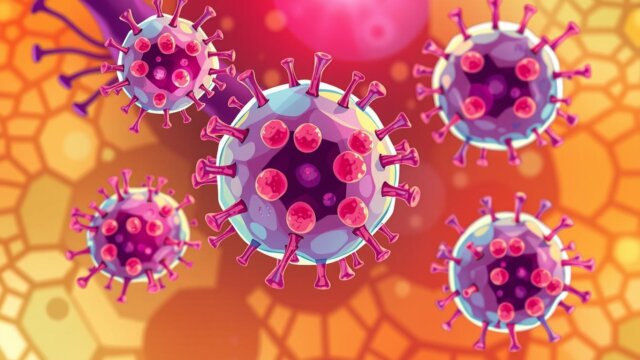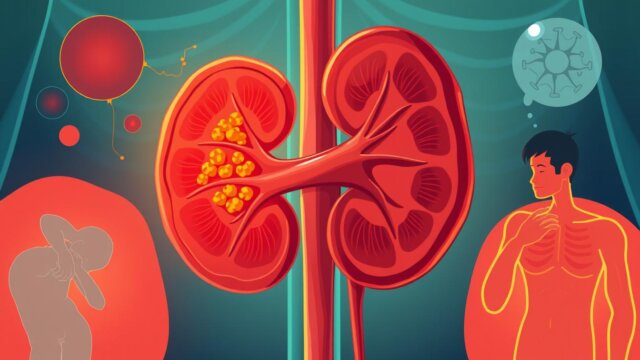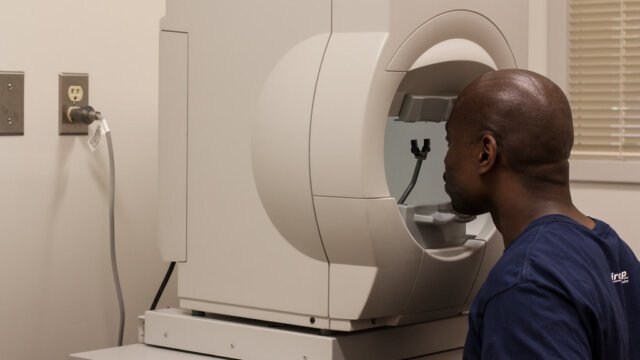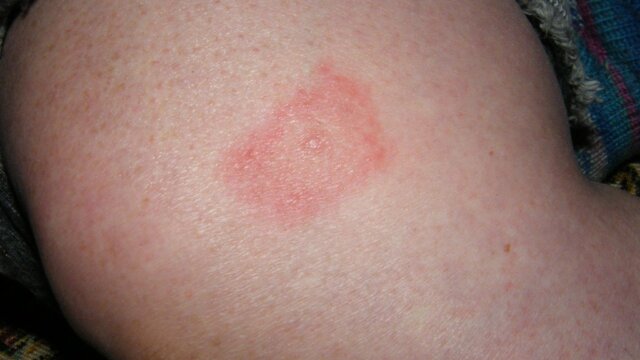FTC disclaimer: This post may contains affiliate links and we will be compensated if you click on a link and make a purchase.
Colorectal cancer is a silent killer, taking over 50,000 lives in the U.S. each year. It mostly hits people over 50, but it’s also rising in younger adults. This guide will help you understand colorectal cancer, from causes to treatments.
Colorectal cancer affects the colon and rectum. These parts of the large intestine and digestive tract are key. Knowing the differences between colon and rectal cancer is important. Each type needs its own care plan.
Key Takeaways
- Colorectal cancer is the third most common cancer in the U.S.
- Early detection through regular screening is crucial, as it can significantly improve outcomes.
- Risk factors for colorectal cancer include age, family history, genetic predisposition, and certain lifestyle factors.
- Advancements in treatment options, such as surgery, radiation, and chemotherapy, have enhanced the prognosis for many colorectal cancer patients.
- Adopting a healthy lifestyle, including a balanced diet and regular physical activity, can help lower the risk of colorectal cancer.
Learning about colorectal cancer helps you make smart health choices. Early detection and proactive care are key. Keep reading to learn more about causes, symptoms, screening, and treatments.
What is Colorectal Cancer?
Colorectal cancer starts in the colon or rectum. It begins with small, noncancerous clumps called polyps. These can turn cancerous over time. Colon and rectal cancers are often called colorectal cancer because they share many traits.
Knowing where and how colorectal cancer grows is key. It helps with early detection and treatment.
Definition and Overview
Colorectal cancer grows in the colon or rectum’s lining. It’s the third most common cancer and the second leading cause of death worldwide. It can take years to develop, starting as non-cancerous polyps.
Types: Colon Cancer and Rectal Cancer
There are two main types: colon and rectal cancer. Colon cancer makes up 49.09% of cases, and rectal cancer is 49.66%. The rest are both types.
The most common colon cancer site is the sigmoid colon. Other sites include the ascending, transverse, descending colon, cecum, and crossing site.
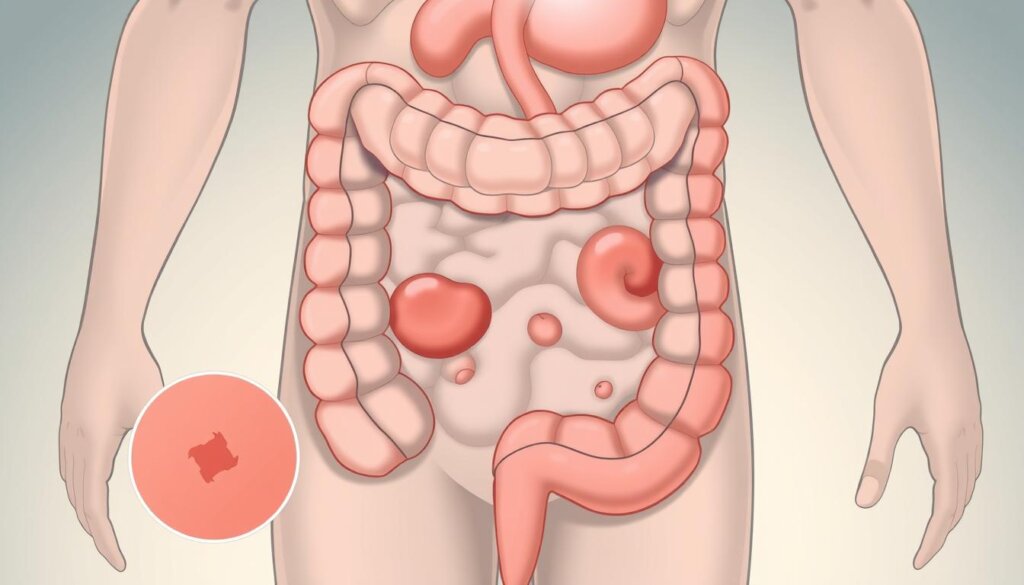
Knowing the difference between colon and rectal cancer is vital. Treatment depends on the location and stage of the disease. Early detection and treatment are key to managing both types.
Symptoms and Early Detection
Common Symptoms of Colorectal Cancer
Colorectal cancer includes colon and rectal cancer. It often doesn’t show symptoms early on. But, as it grows, you might notice changes like diarrhea or constipation. You could also see blood in your stool or feel pain in your belly.
Feeling tired, weak, or losing weight without reason are also signs. If you notice these symptoms, tell your doctor right away. Early detection can help a lot. Doctors might suggest at-home tests for younger people with symptoms, as they’re easy and cheap.
Rectal bleeding is a big warning sign for early colorectal cancer, along with iron deficiency anemia. About half of those with early cancer notice symptoms within 3 months.
“Having three or more of the warning signs was associated with six times the likelihood of being diagnosed with the disease.”
Colorectal cancer is now more common in people under 50, even in their 20s and 30s. Young people are dying from it more than before. Many people with colorectal cancer don’t have a family history or risk factors.
Finding cancer early can cure it. Tests like fecal occult blood test and colonoscopy help find it early.
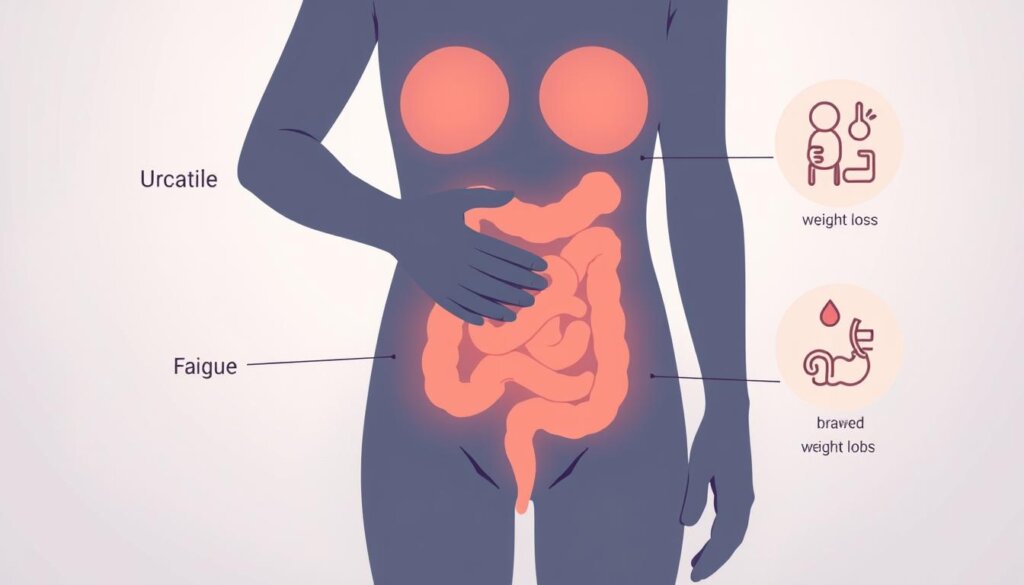
Causes and Risk Factors
Colorectal cancer is a complex disease. Its exact causes are not always clear. Researchers have found several genetic, environmental, and lifestyle factors that can raise a person’s risk of getting this cancer.
Genetic and Environmental Factors
Some genetic mutations and inherited syndromes, like familial adenomatous polyposis (FAP) and Lynch syndrome, can make people more likely to get colorectal cancer. Also, being exposed to radiation and eating a lot of red and processed meats can increase the risk of colorectal cancer.
Lifestyle Factors Contributing to Risk
Lifestyle choices are key in colorectal cancer development. Being overweight, not being active, smoking, and drinking too much alcohol can all raise the risk of this disease. People with a history of colorectal polyps, inflammatory bowel disease, or radiation to the abdomen are also at higher risk.
While some risk factors, like age and family history, can’t be changed, many can be through lifestyle changes. Eating healthy, staying active, and avoiding tobacco and too much alcohol can lower the risk of getting this disease.
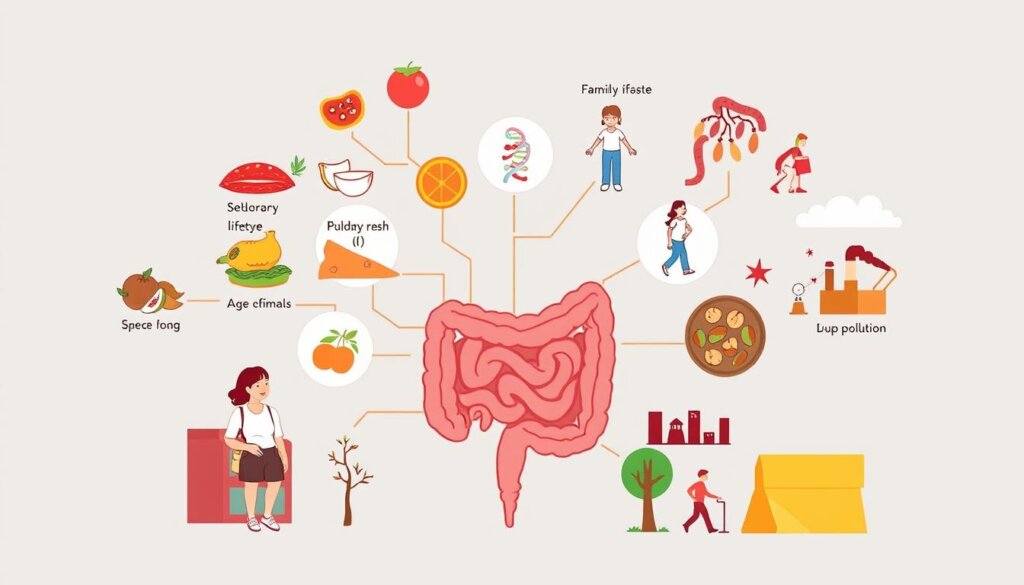
Risk Factor | Impact on Colorectal Cancer Risk |
|---|---|
Overweight or Obesity | Increases risk and risk of dying from colorectal cancer |
Type 2 Diabetes Mellitus | Increases risk due to high insulin levels |
Red and Processed Meats | Increases colorectal cancer risk |
Smoking | Increases risk of developing and dying from colorectal cancer |
Alcohol Use | Increases colorectal cancer risk, even in moderate amounts |
Knowing the factors that lead to colorectal cancer helps people take steps to lower their risk and stay healthy.
Colorectal Cancer Screening and Diagnosis
Regular screening for colorectal cancer is key to early detection and prevention. The American Cancer Society suggests starting regular screening at age 45 for those at average risk. Tests like colonoscopy, fecal occult blood test (FOBT), and sigmoidoscopy can spot polyps or early cancers before symptoms appear.
If a test finds something suspicious, more tests like a biopsy or imaging scans might be needed. These help confirm the diagnosis and find out how far the cancer has spread.
Importance of Regular Screening
Colorectal cancer is the third most common non-skin cancer in men and women. It’s the second leading cause of cancer death in the U.S., after lung cancer. In 2021, about 149,500 people in the U.S. will be diagnosed with it, leading to 52,980 deaths.
While cases are dropping in older adults due to more screening, they’re rising in younger ones.
Diagnostic Tests and Procedures
Many tests help find and confirm colorectal cancer. Tumor markers like carcinoembryonic antigen (CEA) can be found in the blood. A complete blood count (CBC) checks for anemia, and blood tests check liver function, as cancer can spread to the liver.
At-home tests like fecal occult blood tests (FOBT) and fecal immunochemical tests (FIT) are used for screening. When symptoms or other tests show abnormalities, a diagnostic colonoscopy is done.
Molecular tests on advanced cancer cells look for gene mutations to find the right treatment. MSI and MMR testing check for genetic changes to treat and identify Lynch syndrome. Imaging tests like CT scans and MRIs help diagnose and see how far the cancer has spread. Proctoscopy is used for rectal cancer checks. Biopsies confirm tumors found during screening or tests.
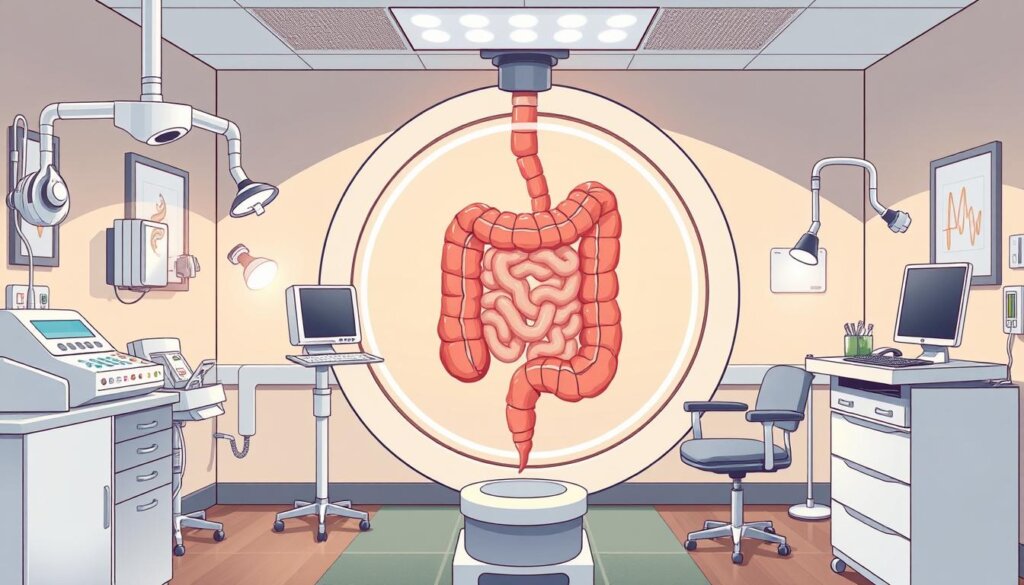
“Early detection is key in the fight against colorectal cancer. Regular screening can save lives by identifying precancerous polyps or early-stage cancers, when they are most treatable.”
Treatment Options for Colorectal Cancer
Colorectal cancer treatment varies based on the cancer’s stage and location. It also depends on the patient’s overall health. Surgery like colectomy or local excision is often the first step for early-stage cancer.
Surgical Interventions
For more advanced stages, more treatments might be needed. These can include radiation, chemotherapy, targeted therapy, and immunotherapy. These treatments are often used together with surgery.
Radiation Therapy and Chemotherapy
Radiation therapy can shrink large cancers before surgery or ease symptoms when surgery isn’t possible. Chemotherapy is used after surgery to lower the chance of cancer coming back. Targeted therapy is used with chemotherapy for advanced cancer.
Immunotherapy is used for advanced cancer to help the body fight cancer cells. Palliative care is also important to improve life quality for patients and their families.
“The treatment options for colorectal cancer are constantly evolving, and it’s essential to work closely with your healthcare team to determine the best approach for your individual case.”
Recent studies have looked into various aspects of colorectal cancer treatment. They’ve studied how chemotherapy side effects affect tumor response. They’ve also looked into reversing resistance to anti-EGFR therapies in metastatic colorectal cancer.
Researchers have also found that probiotics can protect against colorectal cancer. They’ve explored RNA-based therapeutics for colorectal cancer.
They’ve also studied the outcomes of preoperative radiotherapy for rectal cancer. They’ve compared short-course radiotherapy with long-course chemoradiation for T3 rectal cancer. They’ve looked into using volumetric modulated arc therapy and 3D conformal radiotherapy for locally advanced rectal cancer.
They’ve also found that intensity-modulated radiotherapy can reduce acute bowel toxicity in rectal cancer patients.
Ongoing research aims to find new and better treatments for colorectal cancer. They’re looking into adjuvant chemotherapy for colon cancer. They’re also exploring the role of capecitabine in colorectal cancer treatment. Immunotherapy is also being researched for its potential in managing colorectal cancer.
Prevention and Risk Reduction
Some things like age and genetics can’t be changed. But, you can make lifestyle and diet changes to lower your risk of colorectal cancer.
Dietary and Lifestyle Modifications
- Eat lots of fruits, veggies, and whole grains. Try to eat less red and processed meats.
- Stay active. Exercise helps lower your risk of colorectal cancer.
- Keep a healthy weight. Being overweight raises your risk of colorectal cancer and deaths.
- Don’t smoke or quit if you do. Smoking increases your risk of colorectal cancer and adenoma growth.
- Drink alcohol in moderation. Too much can raise your risk of colorectal cancer.
Also, get regular screenings for colorectal cancer. Taking daily aspirin and hormone replacement therapy for postmenopausal women can help lower your risk.
By changing your diet and lifestyle, you can fight colorectal cancer. You’ll also improve your overall health.
Living with Colorectal Cancer
Life after colorectal cancer treatment is both exciting and stressful. Colorectal cancer survivors need to focus on self-care and follow-up care. This helps keep them healthy and lowers the chance of cancer coming back.
Self-Care and Follow-up Care
Regular check-ups and screenings are key to staying healthy. Your healthcare team will create a follow-up care plan for you. This might include tests like colonoscopies and CT scans.
It’s also vital to keep your health insurance and medical records up to date. This ensures you get the best care possible.
Managing long-term side effects from treatment is part of self-care. Your healthcare team can help with this. Eating well, exercising regularly, and avoiding tobacco also helps keep you healthy.
Coping Strategies and Support Resources
Dealing with the emotional and psychological effects of colorectal cancer can be tough. Seeking support through counseling or support groups is very helpful. These resources offer a safe place to share and learn from others.
“Reaching out to others who have been through a similar experience can make a world of difference in your recovery and overall well-being.”
By focusing on self-care, follow-up care, and emotional support, survivors can move forward with hope. Remember, you’re not alone, and there are many resources to help you succeed.
Latest Research and Clinical Trials
The study of colorectal cancer is moving fast. Scientists and doctors are always looking for new ways to fight this disease. They are testing new medicines and ways to treat it together.
This work aims to make treatments better, with fewer side effects. It also wants to improve life for those with colorectal cancer.
Genetic factors are a big focus in research. Scientists have found genes linked to certain types of colon cancer. They also found that some people might do better with certain treatments.
New ways to screen for colon cancer are being tested. This includes genetic tests and looking at the gut’s bacteria. Researchers are also looking into how bacteria in the colon might increase cancer risk.
| Ongoing Clinical Trials at Memorial Sloan Kettering |
|---|
| 21-246, 21-313, 19-288, 12-289, 22-438, 18-399 |
Doctors are also comparing old treatments with new ones in trials. A new drug, encorafenib, has been approved for some cases of metastatic colorectal cancer. The FDA also approved a new treatment for advanced colorectal cancer with too much HER2 protein.
Patients can join these trials. This gives them access to new treatments and helps find better ways to fight cancer. By knowing about new research, people with colorectal cancer can make better choices about their treatment.
“Genetic testing has been catapulted into mainstream medicine, influenced by the findings of researchers at Johns Hopkins.”
The future of treating colorectal cancer looks bright. Researchers are working hard to find new ways to help. By joining trials and staying up-to-date, patients can help in the fight against this disease.
Conclusion
Colorectal cancer is a big health worry. It’s expected to affect 151,000 people in the US this year. Sadly, 52,000 will die from it.
But, thanks to more awareness and better treatments, many people are living longer. Knowing the causes and signs of colorectal cancer helps. It lets people take steps to stay safe and get help fast.
New studies and trials are finding better ways to treat and live with colorectal cancer. Survival rates are going up, especially after treatments for liver metastases. By learning and being involved in your health, you help fight this disease.
Preventing colorectal cancer is crucial. Eating too much fat and not enough calcium, folate, and fiber raises your risk. Regular checks, like colonoscopies, can catch cancer early. This makes treatment more effective.
By being proactive and informed, you can lower your risk of colorectal cancer. Take charge of your health and stay safe.
FAQ
What is colorectal cancer?
Colorectal cancer starts in the colon or rectum. It begins with small, noncancerous clumps called polyps. These can turn cancerous over time.
What are the main types of colorectal cancer?
There are two main types: colon cancer and rectal cancer. They depend on where the tumor is in the large intestine.
What are the common symptoms of colorectal cancer?
Early stages often have no symptoms. But, as it grows, symptoms may include changes in bowel habits and bleeding. You might also feel abdominal discomfort, weakness, or unexplained weight loss.
What are the risk factors for colorectal cancer?
Risk factors include genetic and environmental factors. These include diet, lifestyle, radiation, obesity, smoking, and alcohol use.
When should I start getting screened for colorectal cancer?
Start screening at 45 if you’re at average risk. Tests like colonoscopy can find polyps or cancers early.
What are the treatment options for colorectal cancer?
Treatment depends on the cancer’s stage and your health. It may include surgery, radiation, chemotherapy, or targeted therapy.
How can I reduce my risk of developing colorectal cancer?
Eat fruits, veggies, and whole grains. Limit red and processed meats. Stay active, maintain a healthy weight, and avoid smoking and too much alcohol.
What should I do if I’m living with colorectal cancer?
Focus on self-care and follow-up care. Manage side effects, stay healthy, and attend check-ups. Emotional support from counseling or groups is also important.
What are the latest advancements in colorectal cancer research and treatment?
Research is ongoing to improve treatments. Clinical trials explore new therapies. The goal is to make treatments more effective and reduce side effects.

